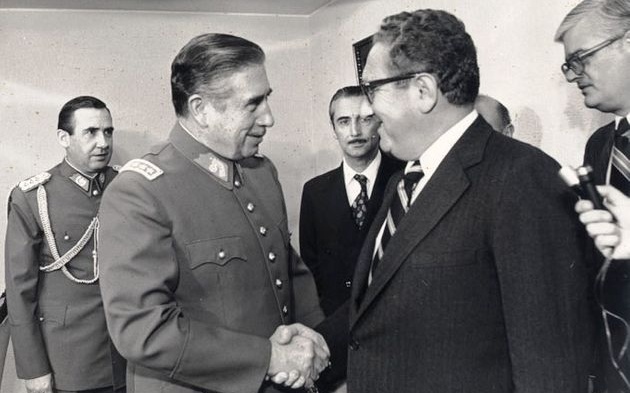Henry Kissinger greets Gen. Augusto Pinochet, the mass murderer whose coup he supported, Santiago, Chile, June 8, 1976
UPDATE, DEC 2:
In a 10-minute interview with BBC World Service, I extended my analysis of the presentation v. the reality of Henry Kissinger’s power politics, explaining how the illusion of “success” obscured the deadly effects of his maneuvers and self-promotion.
Listen to Discussion from 43:55
The conversation begins with a dissection of “detente” with China and Russia. Then it focuses on Kissinger’s use of civilians as pawns, with hundreds of thousands and perhaps millions perishing, to pursue American power — and his own.
The people in other countries were always expendable. You could overthrow their governments, launch covert operations and attack them. Or you could encourage their governments to carry out mass killing, either of their population or those in neighbors.
So, with that destructive record, how did Kissinger maintain his image in the US and abroad as a “wise elder statesman”? It was all about the showmanship.
Forty years before the rise of another showman, a guy named Donald Trump, we saw what a showman and his spectacle could do.
In Washington — which is quite a small town at the top — Kissinger was brilliant in the social environment, sometimes flattering people, sometimes threatening them. What he did was set the terms of the conversation.
ORIGINAL ENTRY, NOV 30: I spoke fully and frankly with Dublin NewsTalk’s Pat Kenny Show and BBC Radio Wales on Thursday about Henry Kissinger, the former US National Security Advisor and Secretary of State who died hours earlier.
More importantly, I cut through the spin and bowing of the knee in many obituaries, fed by Kissinger’s decades of self-promotion, to remember the 100,000s or even millions — historian Greg Grandin estimates between 3 and 4 million — whom he helped kill around the world.
Listen to Pat Kenny Show from 2:28.23
That total includes hundreds of thousands in both Vietnam and Cambodia. (The satirist Tom Lehrer summarized for the ages, “Political satire became obsolete when Henry Kissinger was awarded the Nobel Peace Prize”.) Hundreds of thousands also perished in East Pakistan, now Bangladesh, when Kissinger encouraged Pakistan’s mass killing in 1971. It includes tens of thousands in East Timor, killed with Kissinger’s “green light” to Indonesia in 1975; in Chile, eliminated by the Pinochet junta whose 1970 coup was supported by the Nixon Administration, and in other countries.
Meanwhile, as much of the American press fawned over him, he encouraged Richard Nixon to wiretap reporters and other critics, setting up the downfall of Watergate.
Listen to BBC Radio Wales from 1:51.15
How and why could Kissinger do this? Because his overriding belief was in his conception of “American power” — and his master was his ego.
Amid the mass killing which he encouraged, he publicly pose in July 1975, “This nation must be true to its own beliefs or it will lose its bearings in the world.”
But in private, he said — and even cheered — his deception and his true position that morality was disposable: “The illegal we do immediately. The unconstitutional takes a little longer.”

